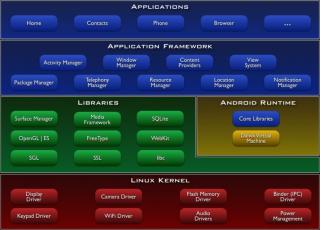Chrome OS is designed to be a light-weight OS for the net today, where applications are hosted on the cloud and access via wireless or wireline broadband connection. It is initially targeted at netbooks. What's this translate into plain English: slower CPU, small screen/keyboard/mouse, and storage on-line.
Google aims to make Chrome OS fast and lightweight, to allow system start up in seconds. It has a minimal user interface, and let the application take care of other aspects of the user experience. Most interestingly, it has a security architecture redesigned to prevent virus and malware.
At the moment, not much is known about Chrome OS's software architecture, except it is "Chrome running within a new windowing system on top of a Linux kernel". But there are comment that Android and Chrome OS might "merge even closer" in the future. This make sense because there are many overlap functionalities between the two platforms. So, let me jump ahead and assume that these OSs going to be merged in the future. If I were to make them common in the future, I might well start to design them similarly or even reuse as much as possible.
Here's an architecture view of Android:

From the view, I'd think the Linux kernel, libraries, and application framework can reuse on Chrome OS. The Android run-time is dropped, obviously. On the application layer, only one application - Chrome is running.
Meanwhile, some tweaking on the application framework is needed to address how Chrome to access hardware; LAN/Wifi/broadband network device, build-in camera, printer, and etc. One solution I can think of is to add a web server-like service to provide local device access via HTTP. Afterall, we already configure WIFI router via web interface and there are WIFI web camera to stream video; We are just moving these functions to access local devices. In addition, Chrome already used Gears for off-line operations.
Viola, Chrome OS we got here.
Further reading:
10 Things We're Dying to Know About Chrome OS
 My passion has always been on software development, and I know it since I
wrote my first program on an Apple II. I worked on cellular wireless system
in the past (C/C++) and now focus on web application
(LAMP, PHP, MySQL, CakePHP, Symfony, jQuery, Google AppEngine/python).
My passion has always been on software development, and I know it since I
wrote my first program on an Apple II. I worked on cellular wireless system
in the past (C/C++) and now focus on web application
(LAMP, PHP, MySQL, CakePHP, Symfony, jQuery, Google AppEngine/python).
![[Valid XHTML 1.0 Strict]](https://edmondhui.ddns.net/blog/skins/admun3/valid-xhtml.png)
Comments
Google says chrome is net based. But apart from developed countries, internet connectivity and speed in other countries are questionable. And what about storage of file to local disk which may need a download manager which already the chrome browser lacks ? While the linux kernel may be secure (may not be better than bsd but definitely better tha windows) the applications for multimedia need to be coded new. And linux is a poor performer in digital photography, video cameras , printer / scanners since a number of manufacturers don't support linux as on date. Yet if Chrome OS could get rid of these hiccups , definitely Microsoft will face a stiff and tough challenge hitherto unknown.
Leave comment
Trackback